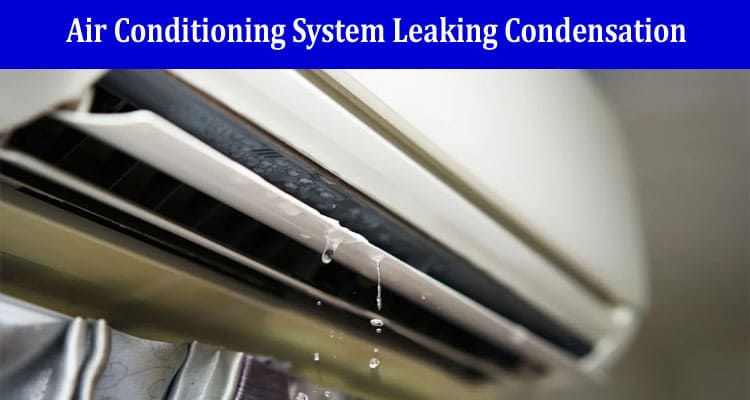If you notice any condensation leaking from your air conditioning unit, it could indicate an underlying issue that requires immediate attention. A reputable air conditioning service company can help you identify and address the problem before it worsens. Here are some reasons your air conditioning unit might be leaking:
Clogged Drain Line
The drain line in your air conditioning system carries excess moisture away from the unit. A clogged drain causes slow draining or complete blockage of water flow, leading to leaks and potential damage to your system’s plumbing lines. Buildups of debris or mineral deposits can contribute to clogged drain lines in your air conditioning system.
Damaged Condensate Pan
A damaged condensate pan is a common issue that can cause leaking and condensation around air conditioning units. This problem can occur for various reasons, such as wear and tear, corrosion, or poor maintenance. One of the leading causes of a damaged condensate pan is regular use over time. As the air conditioning unit operates, it produces condensation, which collects in the pan. Due to its constant exposure to moisture, the pan can develop cracks or holes, leading to leakage. Corrosion can also contribute to a damaged condensate pan. Over time, the metal in the pan can rust due to prolonged contact with water and humidity. This can weaken the structure of the pan and cause it to crack or break apart, resulting in leakage and condensation on the unit.
Low Refrigerant Levels
When refrigerant levels are low, your air conditioning unit may experience decreased cooling capacity. Leaks within the system and condensation on the unit may cause and indicate low refrigerant levels. These leaks can occur due to aging components, poor installation, or even physical damage to the unit. Regular maintenance checks can help prevent and detect low refrigerant levels before they cause a more significant problem. If you suspect your refrigerant levels are low, seek an air conditioning service to address the issue promptly.
Improperly Installed Unit
Improper installation of an air conditioning unit can lead to several issues, including leaks and condensation. When water accumulates and leaks from the system due to improper installation, a professional air conditioning service is often required to address the issue. Installing an AC unit without proper training can result in costly mistakes, such as incorrect wiring, loose drain lines, or improper unit placement. These problems can lead to leaking and condensation buildup, affecting your air conditioning system’s overall efficiency and lifespan.
Improperly Sized AC Unit
An air conditioner that is too small for its cooling space will have to work harder to cool the air. This may cause the unit to create excess moisture that can leak from the unit. An oversized AC unit may cycle on and off too frequently, not allowing enough time for proper dehumidification, resulting in condensation buildup. Consult a professional HVAC technician to determine the correct size and model for your home’s needs.
Clogged Air Filters
A clogged air filter may cause condensation buildup around your unit and other potential damage. Clogged filters can restrict airflow, leading to reduced efficiency and higher energy bills. It can also lead to poor indoor air quality, as pollutants and allergens are filtered out of the air less effectively. A dirty air filter can strain your HVAC system, leading to potential breakdowns and costly repairs.
Book an Air Conditioning Service Today
Professional air conditioning services can boost the performance and efficiency of your unit. Regular maintenance helps prolong its lifespan and prevent unexpected breakdowns, saving you from costly repairs. A well-maintained air conditioning system can provide cleaner air for improved indoor air quality, promoting better health for you and your family. Schedule a professional air conditioning service today if you’ve noticed condensation or leaks coming from your system.


